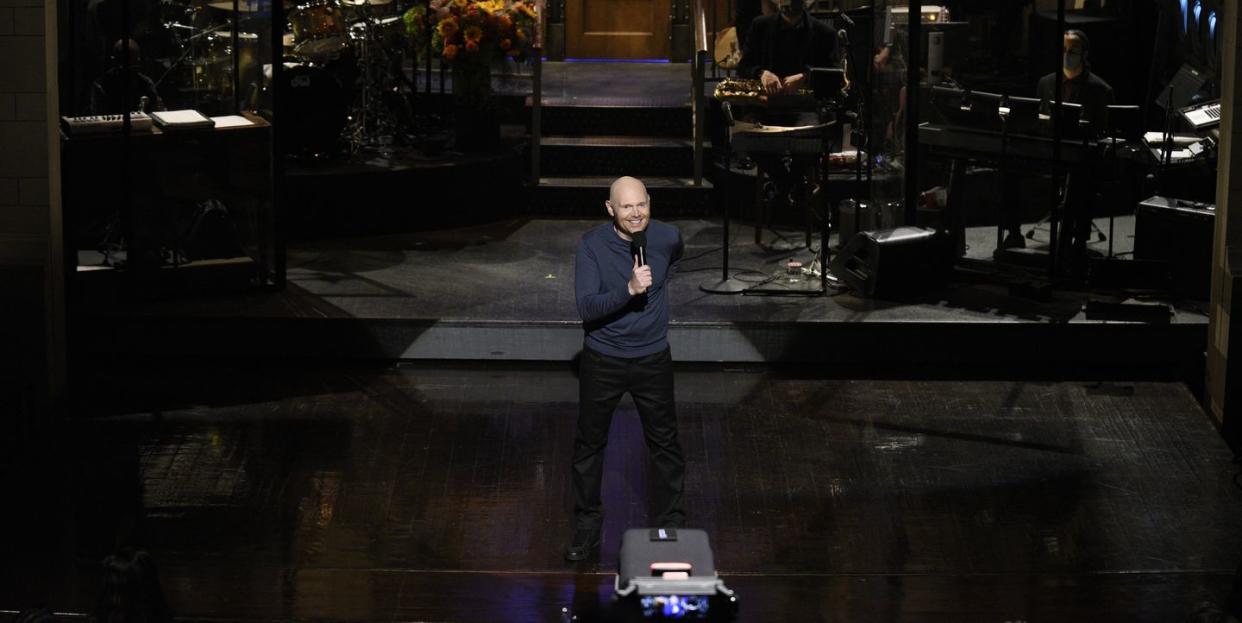"SNL' Host Bill Burr Took Aim at White Women, Cancel Culture, and Gay Pride in a Controversial Monologue

- Oops!Something went wrong.Please try again later.
Well, that was a lot. In his opening monologue, SNL host Bill Burr went straight for the jugular, plowing through multiple sensitive topics with his signature politically incorrect style to varying degrees of success. The polarizing stand-up comic openly mocked everyone from anti-maskers to white women and attempted to take down cancel culture and Pride month too.
"Take out your grandparents," Burr joked about anti-maskers after saying he wasn't bothered by them. "Take out your weak cousin with the asthma. I don’t care. It’s your decision. There’s too many people. It’s a dream come true. If you’re that dumb and you want to kill your own family members, by all means do it. It stops you from reproducing."
Burr then took on white women, who he claimed in no uncertain terms had highjacked wokeness. “The woke movement was supposed to be about people of color…" said Burr. "And then somehow white women swung their Gucci-footed feet over the fence of oppression and stuck themselves at the front of the line."
Ignoring the noticeably hesitant audience, Burr called out white women for complicity. "You guys stood by us toxic white males through centuries of our crimes against humanity. You rolled around in the blood money, and occasionally when you wanted to sneak off and hook up with a Black dude, if you got caught, you said it wasn’t consensual.”
He has a point. In fact, plenty of other people have made this point in more compelling and funny manners. Take for instance Amber Ruffin's hilarious rendition of the '80s pop hit "Somebody's Watching Me" renamed to "White Women Watching Me."
Things went really awry when Burr began discussing Pride. In a strained attempt to cover up what seemed like pretty straightforward homophobia, Burr claimed to have never heard of Gay Pride until this year: "They didn't have that when I was a kid!" He then compared Pride month to Black History Month and suggested that the former is excessive. "The month of June is gay pride month. That's a little long. Don't you think?" asked Burr. "For a group of people that were never enslaved?" Tearing down one marginalized group is a weird way to show support for another.
Burr's set seemed especially combative given the low-risk monologues we've come to expect from hosts over the years. How many times have we all had to endure the softball "ask an audience member a question" segment? Even other stand-ups like Amy Schumer and Chris Rock have opted for safe jokes when hosting, despite having plenty of controversial material in their arsenals (Check out Rock's special "Tambourine"), that they knew wouldn't offend woke Twitter.
In most cases, deciding to play something safe is the product of risk analysis. For comedians, the risk is backlash; and when put on a stage as big and bright (and televised) as SNL, the risk increases. In that scenario, playing it safe makes sense—especially if you're a high profile comedian slinging jokes in the era of Woke Twitter. Given the amount of comedian controversies that have gone down in the past few years, no one should blame Chris Rock for doing a set that focused on canceled plans, breakups, and, the safest target of all—America's federal government.
But for a lower profile comedian like Burr, who has a dedicated army of fans who swear by his style of comedy, the ultimate indicator of success isn't surviving cancellation. It's provoking a reaction—good or bad. And by that metric, Burr's monologue was a hit. Across social media, comments came crashing in with some praising the set as hilarious and spot on, while others criticized Burr of homophobia and sexism.
There is no real "time" for that Bill Burr monologue, but I'll tell you what, now is NOT IT
— Jen Chaney (@chaneyj) October 11, 2020
That Bill Burr monologue was fucking hilarious. And so well crafted minus the cancel culture part that bombed.
— roxane gay (@rgay) October 11, 2020
Can't wait to be told this story is cancel culturehttps://t.co/GA5ybmAp8m
— Kevin Fallon (@kpfallon) October 11, 2020
In a particularly prescient moment, Burr actually discussed cancellation and made a prediction about his own fate. "I'll probably get canceled," he groaned, to almost no applause, halfway through his set. Maybe, maybe not. But either way, he'll have succesfully reenergized the tired and divisive debate around cancel culture. And for that, he deserves all the heat he gets.
You Might Also Like
